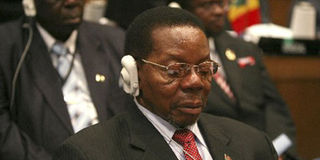African leaders dissolve Nepad as Addis meeting closes

The new African Union (AU) Chairman and Malawian President Bingu wa Mutharika attends the summit in Ethiopia's capital Addis Ababa. African leaders dissolved Nepad as the Addis meeting closed. Reuters
ADDIS ABABA, Tuesday
African leaders today wrapped up their annual summit less divided and looking at brighter economic prospects but still facing a raft of conflicts, including Sudan’s predicted break-up.
One of the resolutions adopted was one that dissolved was the New Partnership for Africa Development (NEPAD) and agreed to replace it by a new agency.
Nepad disbandment comes after a very sharp criticism against the body which couldn’t deliver a single project during the last one decade.
Nepad was established in July 2001 as a programme of the defunct Organisation of African Unity (OAU) and the mandate was given leaders of Algeria, Egypt, Nigeria, Senegal and South Africa to steer it.
Ethiopian prime Minister Meles Zenawi has been the chairman of Nepad for the last one decade.
Leaders approved the establishment of the Nepad Planning and Coordinating Agency (NPCA) to replace Nepad.
Nepad’s primary objective was to eradicate poverty and promote prosperity and to halt the marginalization of Africa In the globalisation process. The new agency will be a body of African Union and mandated to facilitate and coordinate the implementation of continental and regional priority programmes and mobilise resources and partners in support of their implementation.
The summit allocated $3 million as start up funding for the new office.
Another resolution adopted was one increasing the pressure on Madagascar leader Andry Rajoelina, who seized power in a coup in March and did not attend the summit.
The 53-member body’s approach to Madagascar had been typical last year of African discordance, with Libyan leader and outgoing AU president Muammar Gaddafi breaking from the tough stance of the organisation’s executive to back the coup.
Closing ceremony
At the closing ceremony, incoming African Union chairman and Malawian president Bingu wa Mutharika urged African leaders to invest on food security and Agriculture.
Bingu also sought to boost transport infrastructure and energy which he said are key to peace and security.
Bingu secured an overwhelming support from the summit and the 53 member state organisation will devote its effort on Bingu’s roadmap to end conflict and hunger. “No chilled in Africa dies of hunger and malnutrition anymore” Bingu said in the closing event of AU head of states three days summit.
Bingu outlined his priorities and in terms of peace and security and urged African leaders to cooperate with AU to unseat power grabbers and unconstitutional change of government. “Unconstitutional change of government threatens peace and security of the continent” he said.
He noted that 2010 is a year of Peace and Security in Africa and we must say ‘never again’ to conflict and war in Africa.
During the summit, leaders defined coups as “unconstitutional power change” and the AU was given more authority to act on it.
AU Peace and Security Commissioner Ramtane Lamamra told the Nation the summit gave new authority to the AU to act on and unconstitutional change of governments in Africa.
The summit also deliberates on the agenda of African common position on the International Criminal Court (ICC) which has indicted Sudanese President Omar al-Bashir calling for fairness in its activities.
The summit also endorsed the newly elected peace and Security Council members, the most powerful body of AU, and Zimbabwe was elected to a three-year term, along with Equatorial Guinea, Kenya, Libya and Nigeria.
Others elected to two-year terms were Burundi, Chad, Djibouti, Rwanda, Mauritania, Namibia, South Africa, Benin, Cote d’Ivoire and Mali.




